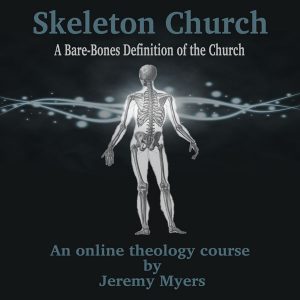Do you feel exhausted and overwhelmed by life? Is sin and temptation beating you at every turn? Do you feel defeated and ineffective in your attempts to follow Jesus in discipleship? If so, then the truths of Ephesians 1:20-23 are for you! These verses reveal that you have all the power of God at your disposal. Therefore, you can be victorious in your Christian life! This podcast study on Ephesians 1:20-23 also includes a discussion about crusade evangelism like those put on by the Billy Graham Evangelistic Association and Greg Laurie.
Are Evangelism Crusades Effective?
Here is a question from a listener:
What do you think of crusade revivals like Billy Graham or Greg Laurie outreaches? Don’t you think there are many ways to evangelize?
Yes, there are many, many ways to evangelize. Evangelism crusades like those of Billy Graham and Greg Laurie are only one way … and in my personal opinion, maybe the least effective form of evangelism.
(#AmazonAdLink)  I have a large section devoted to evangelism in my giant book (1275 pages!!!), (#AmazonAdLink) Close Your Church for Good, and in it, I argue that while crusade evangelism has indeed done a lot to help spread the gospel and bring people into the family of God, crusade evangelism does a terrible job of follow-up discipleship and helping make long-term, faithful, and committed followers of Jesus Christ.
I have a large section devoted to evangelism in my giant book (1275 pages!!!), (#AmazonAdLink) Close Your Church for Good, and in it, I argue that while crusade evangelism has indeed done a lot to help spread the gospel and bring people into the family of God, crusade evangelism does a terrible job of follow-up discipleship and helping make long-term, faithful, and committed followers of Jesus Christ.
Crusade evangelism gets a lot of media attention and glory because of the crowds it attracts, but relational evangelism is far more effective because it builds an actual, loving, and ongoing relationship with someone so that you can be there for them in the trials and problems that come with following Jesus.
When you develop a long-term friendship with someone, they see the struggles and challenges you face. They watch you deal with lost jobs, broken marriages, and moral failures. But through it all, they also observe your faith and commitment to following Jesus and serving others.
It’s not perfect. It’s not glorious. But it’s real. There are no jumbotrons and spotlights, but there are small acts of love. There are no news headlines, but there are daily commitments to faith and hope in God, even when God doesn’t act like we think He should.
God brings people into His family in all sorts of ways, and Crusade Evangelism is one of them. But it is not the only way of evangelism, nor (in my opinion) is it even the best.
You can read a bit more about crusade evangelism in these two posts:
Better yet, just get my giant book, (#AmazonAdLink) Close Your Church for Good, to get pretty much everything I have written about evangelism.
You have the Power! (Ephesians 1:20-23)
Everybody wants power. Kids want power. Adults want power.
Some seek it through getting lots of money. Some people seek power through political office. Many presidents, senators, congressman are where they are simply because they have a lust for power.
Of course, power is not a bad thing. Power is not evil. It is like food or money or possessions. These are not bad things, but if they become our obsession, they become idols. If we want too much of these things, they become perverted from what they were designed for. Power is not a bad thing, as long as it comes from the right source, and is used correctly.
In fact, what the world longs for—ultimate and all-consuming power—guess what?—Christians already have.
It is interesting, is it not, that most of the things the world longs for—never-ending life, overwhelming joy, unconditional love, satisfaction, power—all of these things are already found … and only found … in the Christian life.
Today we are just looking at the power that we have as Christians.

We briefly talked about power already in Ephesians 1:19, but Paul spends the next four verses (Ephesians 1:20-23) explaining more about the power we have as Christians. Let’s look briefly at the end of Ephesians 1:19 as a way of introducing this power.
Ephesians 1:19. …That power is like the working of his mighty strength,
Paul uses three terms for power here. The first term in the Greek is working. It is the Greek word energion. It is from this that we get the English word energy. Energion is supernatural energy. It is the powerful working of God.
The second word is kratos. It means power. This word is used 12 times in the New Testament and in eleven of those it refers to power that belongs to God alone. The twelfth time, found in Hebrews 2:14 shows that Satan has a similar kind of power—but it is only the power of death. Satan gained this power by rebelling against God, but at the end of time, the power of death will be destroyed.
The third word in this verse is iskus. It means might or strength.
Now, why have I gone into so much detail about this power? I went into detail because Paul used three different words to describe God’s power, and whenever Scripture says something three times in a row, it is worth noting. Scripture says elsewhere that God is “Holy, Holy, Holy” (Isa 6:3; Rev 4:8), which means that He is perfectly holy. It is one of His supreme attributes.
 So here, when the Bible says (cf. also Ephesians 6:10) that God is powerful, powerful, powerful, we know that He is completely powerful. It also is one of His primary characteristics. In theological terms, we say that God is omnipotent – all powerful.
So here, when the Bible says (cf. also Ephesians 6:10) that God is powerful, powerful, powerful, we know that He is completely powerful. It also is one of His primary characteristics. In theological terms, we say that God is omnipotent – all powerful.
But what does that mean? Power is a little abstract, right? It’s hard to get a grasp on how powerful God is. So Paul gives us in the next four verses some concrete examples of how great this power is. Let us begin with Ephesians 1:20.
Ephesians 1:20. … which he exerted in Christ when he raised him from the dead and seated him at his right hand in the heavenly realms,
How great is this power of God? Well, first of all, God used it when He raised Jesus from the dead. Do you know any power of this world that can do that? There are many powers in the world that can take life. In fact, as I just mentioned, that is the kind of power Satan has.
But God has the kind of power that gives life. The power that raised Jesus from the dead, as the verse says. But Ephesians 1:20 says even more than that.
It also says that Jesus Christ was given a seat at the right hand of God in the heavenly realms. He was not just raised from the dead; He was also given the right to rule at God’s right hand!
Remember when we looked at Ephesians 1:3, we learned that the phrase “in heavenly places” does not refer to some otherworldly location where only God and the angels dwell, but instead refers to this present earthly location.
As stated in that study, while the phrase “in the heavenlies” does refer to a spiritual reality, it refers to the spiritual reality as it is carried out in the physical realm, here on this earth, during our lives now.

So when Jesus ascended into heaven to sit at the right hand of God, what this really means is that He ascended to His throne to rule and reign over this earth, so that He could bring the reality of heaven down to this earth. The rest of the letter of Ephesians explain exactly how Jesus does this … but Paul gives a foreshadowing of how this occurs right here in Ephesians 1:21-23.
In Ephesians 1:21, we see the beginning of what it means for Jesus to rule over the earth.
Ephesians 1:21. [Jesus is seated] … far above all rule and authority, power and dominion, and every title that can be given, not only in the present age but also in the one to come.
In Paul’s day, these five words—rule, authority, power, dominion and title—described different levels of spiritual beings. It is kind of like a spiritual hierarchy. But guess what? It is not just a spiritual reality. The Bible reveals that the terms Paul uses here refers to spiritual realities that govern, guide, and direct the earthly rulers, governments, and political leaders of our world.
(#AmazonAdLink)  The terms “rule, authority, power, and dominion” refer to earthly rulers, nations, institutions, and powers that dominate this world (cf. Dan 4:35, 10:13). Walter Wink’s book, (#AmazonAdLink) Naming the Powers, is the best available study on this subject if you want to learn more. (His “Powers Trilogy” should be required reading for all Christians, so also get (#AmazonAdLink) Unmasking the Powers and (#AmazonAdLink) Engaging the Powers.)
The terms “rule, authority, power, and dominion” refer to earthly rulers, nations, institutions, and powers that dominate this world (cf. Dan 4:35, 10:13). Walter Wink’s book, (#AmazonAdLink) Naming the Powers, is the best available study on this subject if you want to learn more. (His “Powers Trilogy” should be required reading for all Christians, so also get (#AmazonAdLink) Unmasking the Powers and (#AmazonAdLink) Engaging the Powers.)
A proper understanding of these terms is critically important for understanding spiritual warfare in Ephesians 6:10-20, and so we will discuss the terms more when we get there.
For now, just understand that Paul’s words here can be understood this way: Paul is saying, “Hey, I know that you have concerns about your government and what they are doing, your local and national leaders and how they seem to only make policies and laws that benefit themselves, the police and how they abuse their power, the financial institutions and how they steal from the poor, the power structures at your job and how they endanger your income, and the social and cultural issues of racism, sexism, and inequality … but all these powers, rulers, and authorities are under Jesus Christ. He has dominion and power over them. So don’t worry about them too much. Jesus is in control.”
Paul’s point here is that we don’t have to worry about these things. He that is in us is greater than he that is in the world. Christ is far above all rule, authority, power, dominion and title.
This is exactly what Paul says in Ephesians 1:22…
Ephesians 1:22. And God placed all things under his feet and appointed him to be head over everything
God took all the things that are wrong about this world, and placed them under the feet of Jesus. That is, Jesus was given authority over them. Jesus, as Paul writes, was appointed to be the head over everything.
But this leads to a problem, doesn’t it?
As we look around at the world, does it look like Jesus is in control of everything?
Are governments, and politicians, and banks, and leaders, and educational institutions, and all the other power structures of our world doing things in the way Jesus would do them?
Hardly!
So how is it that all such things have been placed under the authority of Jesus? How can all such things be brought under the control of Jesus so that they do what Jesus wants done in this world?
The answer is found in Ephesians 1:23.
Ephesians 1:23. … which is his body, the fullness of him who fills everything in every way.
What is Paul referring to here? What is the body to which Paul refers?
 It is the church.
It is the church.
Though Jesus is the answer to the problems of the world, the church is the solution. The church is how Jesus accomplishes changes in the world.
Jesus is in control of the power structures of this world by calling and leading the church to make the changes in this world that Jesus wants.
In other words, to the same extent that the church steps up and does what we are called to do, to that same extent Jesus exerts authority over the world.
Alternately, when the power structures of this world are doing things contrary to the ways of Jesus, this only means that the church is failing in our task to show the world and lead the world into the change Jesus wants to bring into the world.
Let me put it bluntly … all the failures in the world are due to a failure by the church to step up with the power of Christ and lead the world the way Jesus wants.
Sadly, the church often follows the world into the satanic ways of power and greed, when in reality, the church should be leading the world into the ways of Jesus Christ. As goes the church, so goes the world.
When the church steps up as the body of Christ, we, as the hands, feet, and voice of Jesus Christ, will fill everything in every way, and the power of God will flow through us to transform this world in ways that Jesus wants and desires.
Jesus is the head of the world and the head of the church, and as such, the church fills the world and transforms it into the ways of the Kingdom of God.
Pretty exciting concept, right? The rest of the book of Ephesians goes on to explain how exactly the church can step up and be the church in this world that Jesus calls us to be. We will begin looking next time in Ephesians 2:1 about one of the primary power structures of this world and what God has done in Jesus Christ to defeat this power structure, and how we Christians, as members of the body of Christ, can work to achieve this important change in the world.
And by the way, just as one last plug for my book, I have written extensively about all my views about the church in my giant book, (#AmazonAdLink) Close Your Church for Good. The book is almost 1,300 pages, so it is not a quick read. But in it, I explain what the church is and how the church is supposed to function in this world. If that is something you want to learn more about, get your copy today and start wading through it.
Join me again next week when we pick up in Ephesians 2 with one of the most important truths about how God wants to powerfully work in the church to change one of the greatest problems in this world.


 Millions of Christians have questions about church and how to find true Christian fellowship. In this podcast interview, Richard Jacobson and Jeremy Myers discuss how to be the church and why Hebrews 10:25 does not teach that all Christians must attend a church service on Sunday morning.
Millions of Christians have questions about church and how to find true Christian fellowship. In this podcast interview, Richard Jacobson and Jeremy Myers discuss how to be the church and why Hebrews 10:25 does not teach that all Christians must attend a church service on Sunday morning.
 When most Christians read this, they imagine the church as this impregnable fortress, with huge white granite walls, behind which all the people of God huddle together in safety as the forces of evil attack from outside.
When most Christians read this, they imagine the church as this impregnable fortress, with huge white granite walls, behind which all the people of God huddle together in safety as the forces of evil attack from outside. It is not the church that is attempting to hide behind gleaming walls as against an invading army. No, it is Satan and his minions who are huddled behind their blackened walls, hoping that the gates will hold.
It is not the church that is attempting to hide behind gleaming walls as against an invading army. No, it is Satan and his minions who are huddled behind their blackened walls, hoping that the gates will hold. The terrible, tragic reality is that while the church gets so caught up in the debate about who goes to hell, and how long they will be there, and whether or not hell is a place of eternal suffering or temporary purification, we are ignoring the people living in hell on earth all around us.
The terrible, tragic reality is that while the church gets so caught up in the debate about who goes to hell, and how long they will be there, and whether or not hell is a place of eternal suffering or temporary purification, we are ignoring the people living in hell on earth all around us.


 Several of the courses that are offered in the RedeemingGod.com discipleship area will challenge the way you think about church and do church. For many people, the way they “do church” is the only right way to do it, and anybody who does things differently is doing it wrong.
Several of the courses that are offered in the RedeemingGod.com discipleship area will challenge the way you think about church and do church. For many people, the way they “do church” is the only right way to do it, and anybody who does things differently is doing it wrong.
 But if you love theology podcasts, listening to sermons on the radio, and reading books about Scripture and theology, then the discipleship area will be great for you. This is especially true if you love having your mind stretched, if you embrace difficult questions, and if you enjoy being introduced to new ideas and different ways of viewing Scripture.
But if you love theology podcasts, listening to sermons on the radio, and reading books about Scripture and theology, then the discipleship area will be great for you. This is especially true if you love having your mind stretched, if you embrace difficult questions, and if you enjoy being introduced to new ideas and different ways of viewing Scripture. Nevertheless, I believe that Bible study and theology should never be boring, and that it is okay to laugh, have fun, and approach Scripture light-heartedly. Sure, it is the most important area of study in the world, but this doesn’t mean we have to approach it with nothing but frowns and furrowed brows. Let’s laugh, smile, joke, and have fun.
Nevertheless, I believe that Bible study and theology should never be boring, and that it is okay to laugh, have fun, and approach Scripture light-heartedly. Sure, it is the most important area of study in the world, but this doesn’t mean we have to approach it with nothing but frowns and furrowed brows. Let’s laugh, smile, joke, and have fun. If you saw point #11 above, and said, “Hey, Jeremy’s a liar. He said there was only 10, and this is number 11! And now he’s moved on to #12!” then maybe the discipleship group is not for you.
If you saw point #11 above, and said, “Hey, Jeremy’s a liar. He said there was only 10, and this is number 11! And now he’s moved on to #12!” then maybe the discipleship group is not for you.
 Due to many requests, one of my more popular books, Skeleton Church, is now available as a paperback!
Due to many requests, one of my more popular books, Skeleton Church, is now available as a paperback! 
